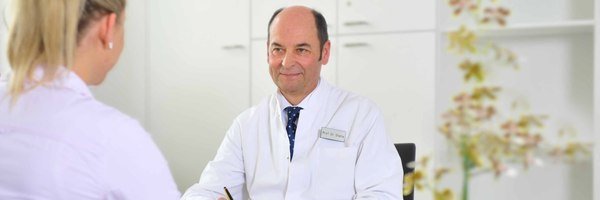
Outpatient Clinic for Neuroendocrinology and Andrology
The Neuroendocrinology Outpatient Clinic at the Max Planck Institute of Psychiatry looks after patients with hormone and metabolic disorders. Our focus is on disorders of the hypothalamus-pituitary-axis (such as acromegaly, Cushing’s syndrome, prolactinoma, hormone inactive pituitary adenoma, diabetes insipidus, endocrine disorders due to traumatic brain injury, sub-arachnoid hemorrhage or tumors such as craniopharyngioma or meningioma), disorders of the peripheral glands (such as thyroid gland disorders and diseases of the adrenal glands and the gonads), metabolic disorders (adiposity, diabetes mellitus) as well as disturbances in sexual development. Furthermore, we are happy to provide follow-up treatment for young patients from pediatrics (transition to adult medicine).
Another focus of the Neuroendocrinology Outpatient Clinic is hormonal treatment for transsexuals undergoing sex reassignment.
Frequently, psychiatric and neurological diseases are accompanied by hormonal and/ or metabolic disorders. Accordingly, we closely cooperate with our in-house Psychiatry and Neurology Outpatient Clinics.
Among our core competences is dynamic testing, result interpretation and treatment of patients suspected of having an endocrine disorder. The test methods carried out in the outpatient clinic include:
- Hormone releasing tests for diagnosing insufficiencies of partial pituitary function
- Insulin-hypoglycaemia test for testing the so-called stress resistance of a patient
- Stimulation tests such as the GHRH-arginine test for diagnosing a growth hormone deficiency
- Suppression tests such as the dexamethasone inhibition test for diagnosing Cushing’s syndrome
- Oral glucose tolerance test (oGTT) for diagnosing acromegaly, diabetes mellitus, hypoglycaemia
In collaboration with other departments of the Institute, we offer a broad spectrum of internal medicine and endocrinological examinations. Apart from ultrasound, bone density measurement[E1] (DXA), magnetic resonance imaging (MRI), electrocardiogram (ECG) and echocardiogram, special diagnostic options, e.g., examinations in the sleep laboratory, neuropsychological tests and visual field examination (perimetry), are at our disposal. In addition to the clinical-chemical aspects and to cytological diagnosis, laboratory services also comprise the entire range of hormone analysis. Furthermore, there is the option to attend individual nutrition and diabetes counselling.
Further explanations on the different examinations, can be found here:
The relationships between hormonal and metabolic changes and neuropsychiatric symptoms are investigated in preclinical as well as in clinical studies by the research group “Clinical Neuroendocrinology” headed by Prof. Stalla. In addition, we are an international study center for clinical studies researching hormonal substitution and pharmacotherapy of endocrine diseases. Within the framework of the “Excellence Network for Neuroendocrine Tumors” (NeoExNET) cooperation project, we carry out long-term observational studies in patients with different diseases, offering dedicated consultation hours. For this project, particular emphasis is put on the acquisition of data regarding neuropsychiatric aspects and quality of life.
The physicians of our Neuroendocrinology Outpatient Clinic are active members in the andrology quality committee of Munich, Upper Bavaria and in the transsexuality quality committee of Munich. Furthermore, we closely collaborate with colleagues in the fields of neurosurgery (Munich and Erlangen), bariatric surgery (Prof. Hüttl, Surgery Clinic at Munich city hospital in Bogenhausen), neurology (Schön hospital in Bad Aibling), andrology/fertility diagnostics and urology (Prof. Köhn, Prof. Schwarzer, Munich).
On behalf of the NADA (national anti-doping agency), Prof. Stalla evaluates and treats competitive athletes.
Within the scope of the network GLANDULA (self-help group for patients with pituitary and adrenal diseases), we also encourage the exchange of experiences between physicians, patients and their relatives. For information on the Munich regional group of the network for pituitary and adrenal disorders (a registered association), please go to: www.hypophyse-muenchen.de.